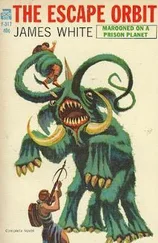James White - The Eighteen Christian Centuries
Здесь есть возможность читать онлайн «James White - The Eighteen Christian Centuries» — ознакомительный отрывок электронной книги совершенно бесплатно, а после прочтения отрывка купить полную версию. В некоторых случаях можно слушать аудио, скачать через торрент в формате fb2 и присутствует краткое содержание. Жанр: foreign_prose, История, foreign_edu, foreign_antique, на английском языке. Описание произведения, (предисловие) а так же отзывы посетителей доступны на портале библиотеки ЛибКат.
- Название:The Eighteen Christian Centuries
- Автор:
- Жанр:
- Год:неизвестен
- ISBN:нет данных
- Рейтинг книги:4 / 5. Голосов: 1
-
Избранное:Добавить в избранное
- Отзывы:
-
Ваша оценка:
- 80
- 1
- 2
- 3
- 4
- 5
The Eighteen Christian Centuries: краткое содержание, описание и аннотация
Предлагаем к чтению аннотацию, описание, краткое содержание или предисловие (зависит от того, что написал сам автор книги «The Eighteen Christian Centuries»). Если вы не нашли необходимую информацию о книге — напишите в комментариях, мы постараемся отыскать её.
The Eighteen Christian Centuries — читать онлайн ознакомительный отрывок
Ниже представлен текст книги, разбитый по страницам. Система сохранения места последней прочитанной страницы, позволяет с удобством читать онлайн бесплатно книгу «The Eighteen Christian Centuries», без необходимости каждый раз заново искать на чём Вы остановились. Поставьте закладку, и сможете в любой момент перейти на страницу, на которой закончили чтение.
Интервал:
Закладка:
Trajan and Adrian had now made the world accustomed to justice in its rulers; and as far as regards their public conduct, this character is not to be denied. Yet in their private relations they were not so faultless. Trajan the great and good was a drunkard. To such a pitch did he carry this vice, that he gave orders that after a certain hour of the day none of his commands were to be obeyed. Adrian was worse: he was regardless of life; he put men to death for very small offences. An architect was asked how he liked a certain series of statues designed by the emperor and ranged in a sitting attitude round a temple which he had built. The architect was a humourist, not a courtier. “If the goddesses,” he said, “take it into their heads to rise, they will never be able to get out at the door.” A poor criticism, and not a good piece of wit, but not bad enough to justify his being beheaded; yet the answer cost the poor man his life. As Adrian grew older, he grew more reckless of the pain he gave. He had a brother-in-law ninety years of age, and there was a grandson of the old man aged eighteen. He had them both executed on proof or suspicion of a conspiracy. The popular feeling was revolted by the sight of the mingled blood of two sufferers so nearly related, at the opposite extremities of life. The old man, just before he died, protested his innocence, and uttered a revengeful prayer that Adrian might wish to die and find death impossible! This imprecation was fulfilled. The emperor was tortured with disease, and longed for deliverance in vain. He called round him his physicians, and priests, and sorcerers, but they could give him no relief. He begged his slaves to kill him, and stabbed himself with a dagger; but in spite of all he could not die. Lingering on, and with no cessation of his pain, he must have had sad thoughts of the past, and no pleasant anticipations of the future, if, as we learn from the verses attributed to him, he believed in a future state. His lines still remain, but are indebted to Pope, who paraphrased them, for their Christian spirit and lofty aspiration:—
“Vital spark of heavenly flame!
Quit, oh, quit this mortal frame!
Trembling, hoping, lingering, flying,
Oh, the pain, the bliss of dying!
Cease, fond nature, cease thy strife,
And let me languish into life!
“Hark! they whisper! angels say,
Sister spirit, come away!
What is this absorbs me quite,
Steals my senses, shuts my sight,
Drowns my spirits, draws my breath?
Tell me, my soul, can this be death?
“The world recedes; it disappears!
Heaven opens on my eyes! my ears
With sounds seraphic ring:
Lend, lend your wings! I mount! I fly!
O Grave! where is thy victory?
O Death! where is thy sting?”
His wish was at last achieved. He died aged sixty-two, having reigned twenty-one years. In travelling and building his whole time was spent. Temples, theatres, bridges—wherever he went, these evidences of his wisdom or magnificence remained. He persecuted the Christians, but found persecution a useless proceeding against a sect who gloried in martyrdom, and whose martyrdoms were only followed by new conversions. He tried what an opposite course of conduct would do, and is said to have intended to erect a temple to Jesus Christ. “Take care what you do,” said one of his counsellors: “if you permit an altar to the God of the Christians, those of the other gods will be deserted.”
|A.D. 138.|
But now came to supreme authority the good and wise Antoninus Pius, who was as blameless in his private conduct as in his public acts. His fame extended farther than the Roman arms had ever reached. Distant kings, in lands of which the names were scarcely known in the Forum, took him as arbiter of their differences. The decision of the great man in Rome gave peace on the banks of the Indus. The barbarians themselves on the outskirts of his dominions were restrained by respect for a character so pure and power so wisely used. An occasional revolt in Britain was quelled by his lieutenants—an occasional conspiracy against his authority was caused by the discontent which turbulent spirits feel when restrained by law. The conspiracies were repressed, and on one occasion two of the ringleaders were put to death. The Senate was for making further inquiry into the plot. “Let us stop here,” said the emperor. “I do not wish to find out how many people I have displeased.” Some stories are told of him, which show how little he affected the state of a despotic ruler. A pedantic philosopher at Smyrna, of the name of Polemo, returned from a journey at a late hour, and found the proconsul of Rome lodged in his house. This proconsul was Antonine, who at that time had been appointed to the office by Adrian. Instead of being honoured by such a guest, the philosopher stormed and raged, and made so much noise, that in the middle of the night the sleepless proconsul left the house and found quarters elsewhere. When years passed on, and Antonine was on the throne, Polemo had the audacity to present himself as an old acquaintance. “Ha! I remember him,” said the emperor: “let him have a room in the palace, but don’t let him leave it night or day.” The imprisonment was not long, for we find the same Polemo hero of another anecdote during this visit to Rome. He hissed a performer in the theatre, and stamped and screeched, and made such a disturbance that the unfortunate actor had to leave the stage. He complained of Polemo to the emperor. “Polemo!” exclaimed Antonine; “he forced you off the stage in the middle of the day, but he drove me from his house in the middle of the night, and yet I never appealed.” It would be pleasant if we could learn that Polemo did not get off so easily. But the twenty-two years of this reign of mildness and probity were brought to a close, and Marcus Aurelius succeeded in 161.
|A.D. 161|
Marcus Aurelius did no dishonour to the discernment of his friend and adoptive father Antoninus Pius. Studying philosophy and practising self-command, he emulated and surpassed the virtues of the self-denying leaders of his sect, and only broke through the rule he imposed on himself of clemency and mildness, when he found philosophy in danger of being counted a vain deceit, and the active duties of human brotherhood preferred to the theoretic rhapsodies on the same subject with which his works were filled. Times began to change. Men were dissatisfied with the unsubstantial dream of Platonist and Stoic. There were symptoms of an approaching alteration in human affairs, which perplexed the thoughtful and gave promise of impunity to the bad. Perhaps a man who, clothed in the imperial purple, bestowed so much study on the intellectual niceties of the Sophists, and endeavoured to keep his mind in a fit state for abstract speculation by scourging and starving his body, was not so fitted for the approaching crisis as a rougher and less contemplative nature would have been. Britain was in commotion, there were tumults on the Rhine, and in Armenia the Parthians cut the Roman legions to pieces. And scarcely were those troubles settled and punished, when a worse calamity befell the Roman empire. Its inviolability became a boast of the past. The fearful passions for conquest and rapine of the border-barbarians were roused. Barbaric cohorts encamped on the fields of Italy, and the hosts of wild men from the forests of the North pillaged the heaped-up treasures of the garden of the world. The emperor flew to the scene of danger, but the fatal word had been said. Italy was accessible from the Alps and from the sea; and, though a bloody defeat at Aquileia flung back the invaders, disordered and dispirited, over the mountains they had descended with such hopes, the struggle was but begun. The barbarians felt their power, and the old institutions of Rome were insufficient to resist future attacks. But to the aid of the old Roman institutions a new institution came, an institution which was destined to repel the barbarians by overcoming barbarism itself, and save the dignity of Rome by giving it the protection of the Cross. But at present—that is, during the reign of the philosophic Marcus Aurelius—a persecution raged against the Christians which seemed to render hopeless all chance of their success. The mild laws of Trajan and Adrian, and the favourable decrees of Antoninus Pius, were set aside by the contemptuous enmity of this explorer of the mysterious heights of virtue, which occasionally carried him out of sight of the lower but more important duties of life. An unsocial tribe the Christians were, who rigorously shut their eyes to the beauties of abstract perfection, and preferred the plain orders of the gospel to the most ambitious periods of the emperor. But the persecution of a sect so small and so obscure as the Christian was at that time, is scarcely perceptible as a diminution of the sum of human happiness secured to the world by the gentleness and equity which regulated all his actions. Here is an example of the way in which he treated rebels against his authority. An insurrection broke out in Syria and the East, headed by a pretended descendant of the patriot Cassius, who had conspired against Julius Cæsar. The emperor hurried to meet him—some say to resign the empire into his hands, to prevent the effusion of blood; but the usurper died in an obscure commotion, and nothing was left but to take vengeance on his adherents. This is the letter the conqueror wrote to the Senate:—“I beseech you, conscript Fathers! not to punish the guilty with too much rigour. Let no Senator be put to death. Let the banished return to their country. I wish I could give back their lives to those who have died in this quarrel. Revenge is unworthy of an emperor. You will pardon, therefore, the children of Cassius, his son-in-law, and his wife. Pardon, did I say? Ah! what crime have they committed? Let them live in safety, let them retain all that Cassius possessed. Let them live in whatever place they choose, to be a monument of your clemency and mine.”
Читать дальшеИнтервал:
Закладка:
Похожие книги на «The Eighteen Christian Centuries»
Представляем Вашему вниманию похожие книги на «The Eighteen Christian Centuries» списком для выбора. Мы отобрали схожую по названию и смыслу литературу в надежде предоставить читателям больше вариантов отыскать новые, интересные, ещё непрочитанные произведения.
Обсуждение, отзывы о книге «The Eighteen Christian Centuries» и просто собственные мнения читателей. Оставьте ваши комментарии, напишите, что Вы думаете о произведении, его смысле или главных героях. Укажите что конкретно понравилось, а что нет, и почему Вы так считаете.












